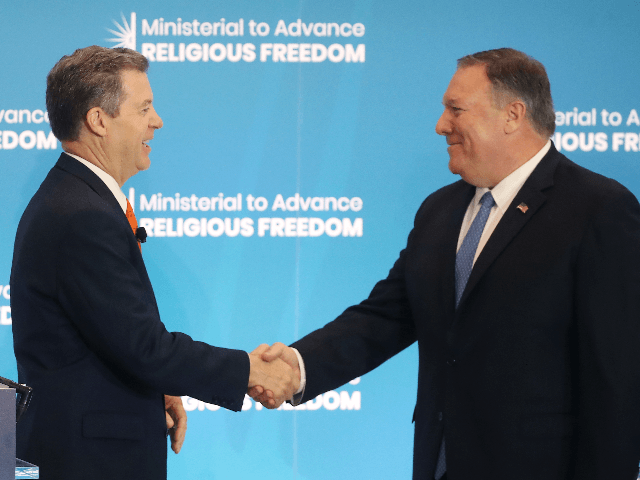WASHINGTON, DC — The U.S. Department of State launched its second Ministerial to Advance Religious Freedom on Tuesday, touted as the world’s “largest religious freedom event of its kind.”
The State Department’s three-day event began a day after a Pew Research Center report revealed that religious persecution is an omnipresent menace worsening across the globe, particularly for Christians, identified as the most mistreated devout group.
“This is the largest human rights event ever hosted at the State Department and the largest religious freedom event ever done in the world,” Ambassador at Large for International Religious Freedom Sam Brownback declared in welcoming attendees.
For its second ministerial, expected to run from July 16 to 18, State invited more than 100 foreign delegations and more than 1,000 civil society and religious leaders from all faiths as well as representatives from persecuted ethnoreligious minorities such as Yazidis from the Middle East and predominantly Muslim Uighurs from China.
This year’s event marks the first time a Secretary of State has convened back-to-back ministerials on the same human rights issue: religious freedom, the State Department noted in a statement. Last year’s inaugural ministerial was the first-ever to solely focus on religious freedom, considered an inalienable human right by U.S. President Donald Trump’s administration.
“All people from every place on the globe must be permitted to practice their faith openly — in their homes, in their places of worship, in the public square — and believe what they want to believe,” Secretary of State Mike Pompeo proclaimed in kickstarting the event on Tuesday.
“I want you to know that America’s commitment to religious freedom will never waver,” he later added. “We stand with you and for you in each stage of this fight.”
Religious freedom promotes prosperity in societies that advance it as a human right, Brownback told a packed room of attendees at a State Department auditorium, including Christians, Muslims, Jews, Hindus, Sikhs, Buddhists, and Falun Gong practitioners, among other worshippers, adding:
[Religious freedom] is a God-given right. Governments must protect it if their people are to prosper. Most people around the world profess a faith and it screams a deep need to nurture that call from within. Governments, of course, are not religious institutions, but they are expected to protect religious faiths and the right of individuals to practice their beliefs without which the faithful cannot thrive.
Government, therefore, provides a key role for people of faith around the world, but the situation is grim, Although most of the world is religious, 80 percent of the world’s population live in a religiously restricted place. It’s time. It is past time to bring down these religious restrictions, to lift the iron curtain. Religious persecution can come down for one, and all and it comes down now.
In January, Open Doors, a group that tracks the mistreatment of Christians across the world, reported that 245 million followers of Christ are facing “extreme” persecution worldwide, sometimes with lethal results, up nearly 15 percent from the 215 million at the beginning of last year.
In 2018, worldwide Christian persecution resulted in 4,136 deaths, 1,266 attacks on worshipping centers, and the detention 2,625 individuals, Open Doors revealed, marking a 35 percent increase from the previous year.
Open Doors’ assessment echoes the Pew Research Center’s tenth annual report on the persecution of all faiths released on the eve of the Tuesday’s Ministerial to Advance Religious Freedom.
Pew found:
Over the decade from 2007 to 2017, government restrictions on religion – laws, policies and actions by state officials that restrict religious beliefs and practices – increased markedly around the world. And social hostilities involving religion – including violence and harassment by private individuals, organizations or groups – also have risen since 2007, the year Pew Research Center began tracking the issue.
The report determined that Christians were the most persecuted religious group, trailed closely by Muslims. Pew noted that Buddhist, Christians, Hindus, and Muslims face more harassment from governments than by individuals or groups in society.
“By contrast, Jews have faced more social harassment than government harassment,” it added.
Most Christians were mistreated by both governments and society in Muslim-majority regions like the Middle East and North Africa. However, the level of harassment against Muslims was also high in Islamic regions as well as Europe.
“Compared with other regions, Muslims were harassed in a higher percentage of countries in the Middle East-North Africa region and Europe (95% and 93% of countries, respectively),” Pew reported.
Pew determined that China, Indonesia, and Russia, which are some of the most populous countries in the world, are among the worst religious freedom offenders with Christians faring worse than other worshippers. Pew found that hatred against religious minorities is widespread, spanning longstanding hotspots in the Middle East and North Africa to the West, namely Europe and the Americas.
While the Americas was the region with the fewest restrictions and hostilities towards religious freedom, the area is reportedly experiencing rising levels of harassment and oppression.

COMMENTS
Please let us know if you're having issues with commenting.